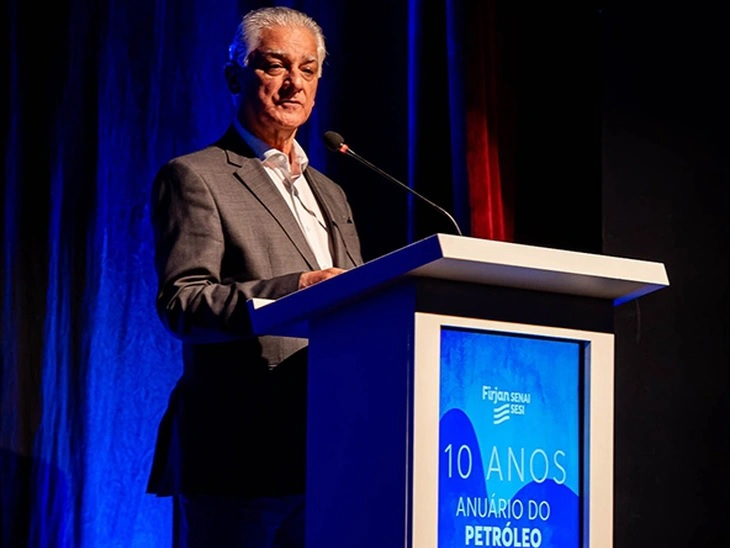
 FIRJAN
FIRJAN
In a special 10-year anniversary edition, the publication by the Federation of Industries of the State of Rio de Janeiro (Firjan) highlights the future of oil.
T&B Petroleum/Press Office Firjan
At the launch of the 10-year anniversary edition of the Rio Oil Yearbook (2016–2025), published by the Federation of Industries of the State of Rio de Janeiro (Firjan), Firjan’s President, Luiz Césio Caetano (pictured), emphasized the importance of fostering "new connections, new projects, and new ways of thinking about the industrial development of our state based on the oil market." He stated that the document serves as an intelligence tool, reinforcing Firjan’s legitimacy as an active voice and highlighting Rio de Janeiro’s leadership role.
"For us, the Yearbook represents the start of a data-driven journey that has enabled other initiatives aimed at strengthening different production chains, such as natural gas, shipbuilding and repair, and, more recently, new energy technologies and solutions that are helping to decarbonize the economy," the president emphasized, adding that Firjan’s commitment is to prepare today what is desired for the future.
Petrobras President, Magda Chambriard, highlighted the significance of oil for the state of Rio de Janeiro, which accounts for about 85% of Brazil’s oil production and, in 2024, received R$ 6.5 billion in taxes paid by the company. "We are proud to produce oil—we’re not ashamed of it. Oil is currently Brazil’s number one export product and the driving force behind Rio de Janeiro’s development," said Magda, also highlighting the importance of the Petrobras Autonomy and Income Program, focused on workforce training and run by Firjan SENAI SESI.
"We are at full employment and we no longer have enough electricians, boilermakers, welders, and others. We count on Firjan SENAI SESI to help train this workforce, which will be absorbed by complexes like Reduc, Polo Boaventura, and Braskem, for example," said the executive, noting that around 3,500 job openings are expected in the short term.
Francilmar Fernandes, PRIO’s Chief Operating Officer, pointed out that over the past 10 years, the market has advanced significantly, and Brazil has undergone a major revolution in the oil and gas sector, overcoming major challenges. But looking ahead, there is still much to be done. "The oil industry of the future is built on economic and environmental competitiveness and sustainability. This competitiveness benefits the entire oil and gas industry, supported by Firjan’s structure and driven by operators who are unlocking projects and bringing them into production more efficiently and sustainably, so that we can all continue to grow," Fernandes emphasized.
During the presentation on the Yearbook, Karine Fragoso, Firjan’s General Manager for Oil, Gas, Energy, and Naval Sectors, explained that the publication tracks "advances in oil production in the state, showing production curve growth, deepwater development, and how the market generates wealth for Brazil from Rio de Janeiro."
Heloisa Borges, Director of Oil, Gas, and Biofuels Studies at the Energy Research Company (EPE), recognized the value of data and information in shaping Brazil’s future, emphasizing the strength of a market that remains essential for both national and global energy development. "In all long-term scenarios, oil appears. There’s no future vision where hydrocarbons aren’t present, driving both the Brazilian and global economy. Even with the progress of the energy transition—even in the most ambitious scenarios—we will still need it. The transition doesn’t mean an immediate replacement but rather a transformation," said the EPE director.
Cassio Coelho, State Secretary for Energy and the Sea Economy of Rio de Janeiro, stressed that when it comes to energy in Brazil, "it’s impossible not to look at Rio de Janeiro." "As a country, we are among the world’s top 10 oil and gas producers, and if Rio de Janeiro were a country, it would currently be the world’s 10th largest oil producer. Given the size of this market, it’s natural to see robust investment plans, such as Petrobras' 2025–2029 Strategic Plan, which forecasts investments of around US$ 111 billion, a significant portion of which will go toward oil and gas exploration and production in offshore Rio de Janeiro," the secretary said.
Luis Fernando Paroli, CEO of Pré-Sal Petróleo S/A (PPSA), noted that the PPSA is expected to generate R$ 17 billion in revenue for the public treasury this year, and about R$ 25 billion next year. He invited the industry to participate in PPSA’s next Union oil sales auction, scheduled for June 26. "PPSA auctions have been gaining credibility and stability, and with each auction, we make small adjustments to the bidding rules to increase competitiveness and encourage more industry participation, ensuring fair and adequate value for the Union’s oil being sold," said Paroli.
The ceremony was held on June 10 at the PRIO Theater, located at the Brazilian Jockey Club, bringing together business leaders and oil market experts. The Rio Oil Yearbook includes contributions from Vice President and Minister of Development, Industry, Trade, and Services, Geraldo Alckmin, as well as from Petrobras, Equinor, PRIO, EPE, PPSA, ANP, and Rystad Energy.
Contact us